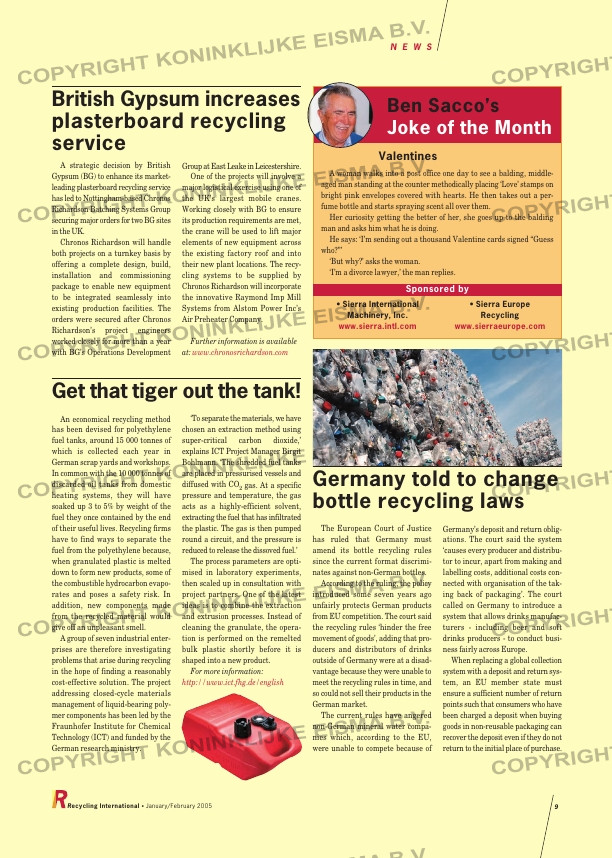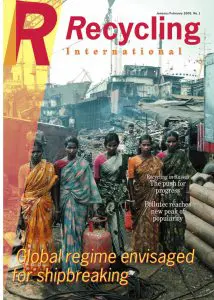Page 9 from: January / February 2005

N E W S
Group at East Leake in Leicestershire.
One of the projects will involve a
major logistical exercise using one of
the UK’s largest mobile cranes.
Working closely with BG to ensure
its production requirements are met,
the crane will be used to lift major
elements of new equipment across
the existing factory roof and into
their new plant locations. The recy-
cling systems to be supplied by
Chronos Richardson will incorporate
the innovative Raymond Imp Mill
Systems from Alstom Power Inc’s
Air Preheater Company.
Further information is available
at: www.chronosrichardson.com
A strategic decision by British
Gypsum (BG) to enhance its market-
leading plasterboard recycling service
has led to Nottingham-based Chronos
Richardson Batching Systems Group
securing major orders for two BG sites
in the UK.
Chronos Richardson will handle
both projects on a turnkey basis by
offering a complete design, build,
installation and commissioning
package to enable new equipment
to be integrated seamlessly into
existing production facilities. The
orders were secured after Chronos
Richardson’s project engineers
worked closely for more than a year
with BG’s Operations Development
The European Court of Justice
has ruled that Germany must
amend its bottle recycling rules
since the current format discrimi-
nates against non-German bottles.
According to the ruling, the policy
introduced some seven years ago
unfairly protects German products
from EU competition. The court said
the recycling rules ‘hinder the free
movement of goods’, adding that pro-
ducers and distributors of drinks
outside of Germany were at a disad-
vantage because they were unable to
meet the recycling rules in time, and
so could not sell their products in the
German market.
The current rules have angered
non-German mineral water compa-
nies which, according to the EU,
were unable to compete because of
An economical recycling method
has been devised for polyethylene
fuel tanks, around 15 000 tonnes of
which is collected each year in
German scrap yards and workshops.
In common with the 10 000 tonnes of
discarded oil tanks from domestic
heating systems, they will have
soaked up 3 to 5% by weight of the
fuel they once contained by the end
of their useful lives. Recycling firms
have to find ways to separate the
fuel from the polyethylene because,
when granulated plastic is melted
down to form new products, some of
the combustible hydrocarbon evapo-
rates and poses a safety risk. In
addition, new components made
from the recycled material would
give off an unpleasant smell.
A group of seven industrial enter-
prises are therefore investigating
problems that arise during recycling
in the hope of finding a reasonably
cost-effective solution. The project
addressing closed-cycle materials
management of liquid-bearing poly-
mer components has been led by the
Fraunhofer Institute for Chemical
Technology (ICT) and funded by the
German research ministry.
‘To separate the materials, we have
chosen an extraction method using
super-critical carbon dioxide,’
explains ICT Project Manager Birgit
Bohlmann. ‘The shredded fuel tanks
are placed in pressurised vessels and
diffused with CO2 gas. At a specific
pressure and temperature, the gas
acts as a highly-efficient solvent,
extracting the fuel that has infiltrated
the plastic. The gas is then pumped
round a circuit, and the pressure is
reduced to release the dissoved fuel.’
The process parameters are opti-
mised in laboratory experiments,
then scaled up in consultation with
project partners. One of the latest
ideas is to combine the extraction
and extrusion processes. Instead of
cleaning the granulate, the opera-
tion is performed on the remelted
bulk plastic shortly before it is
shaped into a new product.
For more information:
https://www.ict.fhg.de/english
Recycling International • January/February 2005 9
Get that tiger out the tank!
Valentines
A woman walks into a post office one day to see a balding, middle-
aged man standing at the counter methodically placing ‘Love’ stamps on
bright pink envelopes covered with hearts. He then takes out a per-
fume bottle and starts spraying scent all over them.
Her curiosity getting the better of her, she goes up to the balding
man and asks him what he is doing.
He says: ‘I’m sending out a thousand Valentine cards signed “Guess
who?”’
‘But why?’ asks the woman.
‘I’m a divorce lawyer,’ the man replies.
Ben Sacco’s
Joke of the Month
Sponsored by
• Sierra International
Machinery, Inc.
www.sierra.intl.com
• Sierra Europe
Recycling
www.sierraeurope.com
British Gypsum increases
plasterboard recycling
service
Germany’s deposit and return oblig-
ations. The court said the system
‘causes every producer and distribu-
tor to incur, apart from making and
labelling costs, additional costs con-
nected with organisation of the tak-
ing back of packaging’. The court
called on Germany to introduce a
system that allows drinks manufac-
turers – including beer and soft
drinks producers – to conduct busi-
ness fairly across Europe.
When replacing a global collection
system with a deposit and return sys-
tem, an EU member state must
ensure a sufficient number of return
points such that consumers who have
been charged a deposit when buying
goods in non-reusable packaging can
recover the deposit even if they do not
return to the initial place of purchase.
Germany told to change
bottle recycling laws



